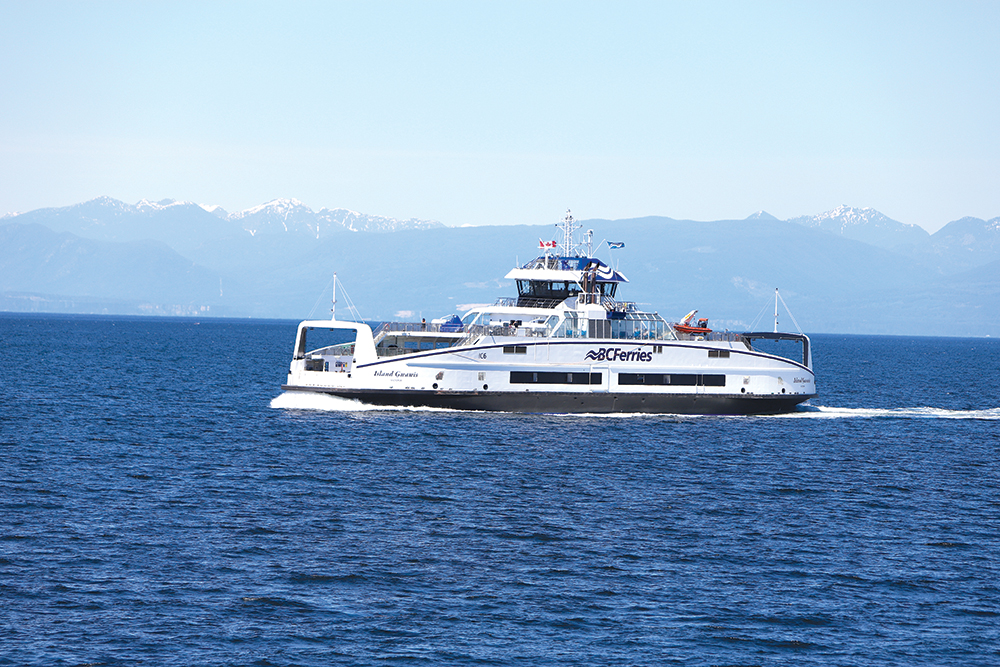Derek Kilbourn
Sounder News
Nicolas Jimenez, CEO and President of BC Ferries, said this past week ferry fares would need to increase by 30% in 2028 to allow the ferry company to keep up with the costs of running the ferry system.
This would mean passenger fares on the Gabriola route in 2028 would be $4.63 higher than 2024; and vehicle fares $10.94 higher than 2024. These are regular fares, not adjusted for Experience Card users.
Jimenez made the comment while speaking to the Victoria Chamber of Commerce.
In a statement provided to the Sounder, Jimenez said he recognized BC Ferries is a marine highway and essential service, critical to the daily lives and economic well-being of coastal residents.
He stated, “we have a responsibility to provide our customers with reliable service to keep people and goods moving in British Columbia.
“We also know demand for ferry service will continue growing rapidly, driven by significant population growth along the BC coast.”
Jimenez says while the growth signals a positive trend for coastal communities, it also creates strain on BC Ferries’ marine infrastructure and fleet, pushing the company’s resources to their limits.
“Even with our current fares, we still don’t bring in the revenue we need to cover our operating costs and all our capital needs, and in many cases that means we’re falling short of what our customers expect.”
A year ago, he said, the company forecast the need for a 30 per cent fare increase in 2028, “to simply keep up and manage our operating and capital costs.
“Since that time, inflation and costs have increased even faster across many aspects of our business and we are facing a growing funding gap as demands on our system increase. For example, it is estimated the cost to build vessels has risen by approximately 40% since 2020. Our customers have been clear in their expectations for a seamless, integrated transportation experience, and the pressing need to replace aging assets requires further investment beyond what the current model allows for.”
BC Ferries is currently operating in what is termed Performance Term 6 (PT6), which started April 1, 2024 and runs through to March 31, 2028.
For each of the years of PT6, the Ferry Commissioner has capped BC Ferries fare increase at 3.2%. This cap was established after the BC Government provided $500 million to BC Ferries in 2023 to keep the fare increases under 3.2 per cent each year of PT6.
No decision has been made yet by the Ferry Commissioner on if there will be fare caps for Performance Term 7.
According to the staff at the BC Ferry Commission, the work to establish Price Caps for the next performance term starts in September of 2026 with final Price Caps to be decided in September 2027.
Heather O’Sullivan sits as co-Chair on the Gabriola Ferry Advisory Committee.
Two weeks ago, BC Ferries announced it would be terminating the FACs as an engagement tool in April of 2025.
O’Sullivan reacted to the statement from CEO Jimenez saying, “I was dismayed to hear this news, and puzzled that it was delivered outside of the usual channels.
“However, given the way that BCF chose to convey the recent news about the dismantling of the FACs, I think it’s safe to say I no longer have any idea what the usual channels are.”
She said it is clear the 30 per cent fare hikes that Nicolas Jimenez has warned of are far outside the bounds of affordability.
“I cannot imagine that either the Ferry Commission or the Province will stand by and watch if BCF insists on pursuing this course of action.”
O’Sullivan said this announcement is yet another illustration of the damage, “done to our marine highway by the former BC Liberals when they balanced the budget by turning BCF into a quasi-private corporation in 2003 under the Coastal Ferry Act.
“With a stroke of the pen they legislated away direct governmental control of essential transportation infrastructure and two decades later the results are even worse than the most cynical of us could ever have predicted.
“I don’t know what the solution is, but it’s certainly not expecting the residents of ferry-dependent communities to bear the brunt of political shortsightedness compounded by corporate mismanagement.”
For BC Ferries part, Jimenez says the fare increase is needed in order for BC Ferries is to be able to make the investments necessary for continued operation of the system.
“We are looking to create a sustainable funding model that is critical for meeting the evolving needs of BC’s communities and supporting the infrastructure that our residents, businesses, and visitors to BC rely on.”
Jimenez says he has already spoken with Mike Farnworth, Minister for Transportation and Transit (MOTT) about the challenges, “and we know collaboration will be needed to solve them.
“BC Ferries always looks for ways to run as efficiently as possible and that’s especially true in the current environment when our costs are rising and affordability is so important for our customers.”
Media staff with MOTT provided the following statement about the 30% increase saying, “We understand how vital a safe, efficient and affordable ferry service is for coastal British Columbia. Like other transportation services, BC Ferries is experiencing rising costs and needs to factor that into its plans moving forward. Our $500 million investment over four years not only keeps fares affordable, it allows BC Ferries to remain focused on delivering the service people need, while growing and modernizing its fleet to improve reliability. Our government has demonstrated our support for people and coastal communities who rely on the ferry service. We are committed to ongoing collaboration with BC Ferries as it addresses its financial challenges beyond the current 4-year performance term.”
BC Ferries communications staff were asked by the Sounder if BC Ferries intends then to apply to have the next performance term (starting April 1, 2028) adjusted to include a 30% fare increase.
They were also asked what kind of financial contribution would be required from government to keep the fare increases to the ones allowed for in the current performance term contract – as well as if there be adjustments made to the different routes (major, minor, northern) to reflect how those routes are utilized by users.
Communications staff responded to these questions saying, “It’s too early to speculate on a number of these items. We’re looking forward to continuing to work with the Province to deliver a reliable and sustainable ferry service that keeps fares as affordable as possible.”





Recent Comments